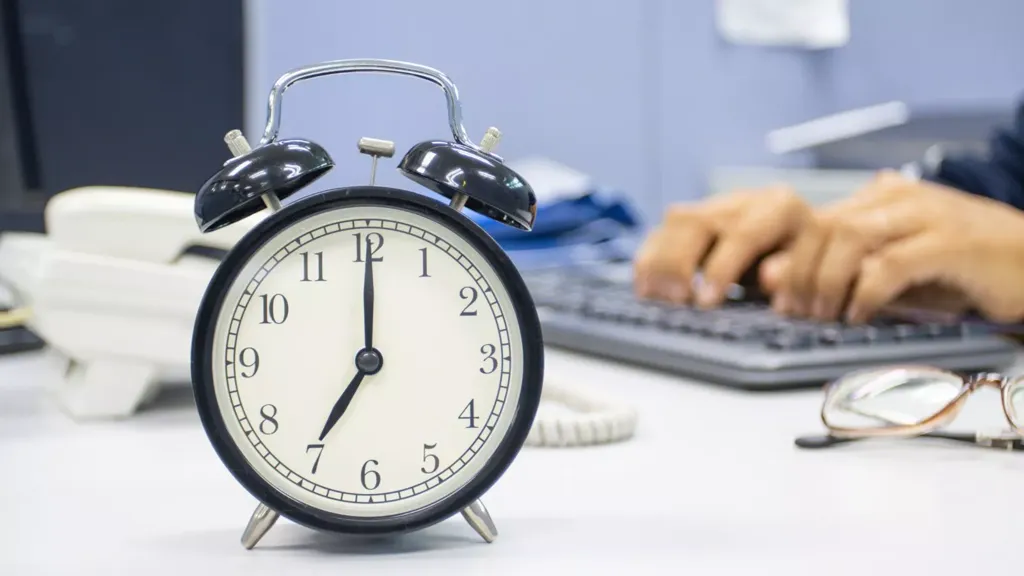Starting your workday before 8 a.m. might seem like a way to get ahead, but health experts say it could be doing more harm than good.
From disrupted sleep and mental fog to long-term health risks, a growing body of evidence suggests that early work hours can impair performance and well-being.
Newsweek spoke to psychologists who outlined some key reasons why you should avoid starting your workday before 8 a.m.
Jessica Meers, a clinical psychologist who is board-certified in behavioral sleep medicine at Rhythm Wellness, emphasized the importance of respecting the body's natural rhythms. She told Newsweek: "The circadian rhythm is responsible for determining when we are most alert, awake, and productive. The ideal time to wake up each morning varies from person to person. Some people would do really well with an early rise time and starting work early."
"However, these people are few and far between. The majority of us don't have a circadian rhythm that supports this early rise time," she said. Meers explained that most people's optimal wake-up time falls between 7 a.m. and 8 a.m., and that "most of us just aren't ready to start the workday this early" due to the circadian misalignment.
Workplace psychologist Marie-Helene Pelletier, who is the assistant vice president at Sun Life U.S., told Newsweek that it's not just about the clock: "That catchy '8 a.m. start' advice might sound good, but the magic isn't in the hour. It's in not jumping into work right after waking up."
"What matters more is giving yourself space between waking up and working," Pelletier added. "Starting too soon after getting up can actually mess with your sleep quality -- your brain senses that 'rush' coming and may make it harder to fall back asleep during those normal, brief wake-ups in the night."
Meers pointed to significant long-term health risks when circadian misalignment is sustained. She warned: "There are cardiovascular effects -- increased risk of heart disease, hypertension, and stroke -- as well as metabolic problems -- increased risk of obesity and type 2 diabetes."
Research supports these claims. A 2022 study in the Journal of Clinical Sleep Medicine found that shift work, which disrupts circadian rhythms, is linked to serious health conditions including heart attacks and diabetes. Another 2023 study in the Journal of Investigative Medicine reported that circadian disruption may increase the risk of colorectal cancer.
Sanam Hafeez, a neuropsychologist in New York City who is the director of Comprehend the Mind, also noted how early starts cut into crucial habits. She told Newsweek: "When work starts early, many people have less time in the morning for important habits, such as exercise or eating a good breakfast. Skipping exercise can lead to reduced energy and increased stress throughout the day. Missing a healthy breakfast means your body and brain don't get the fuel they need to work well."
Sleep plays a critical role in clearing the mind. "Sleep also helps clear out unnecessary information, so your mind stays sharp," said Hafeez. "Without this cleanup, your brain gets overloaded, and memory becomes less reliable."
Pelletier echoed this, warning against diving straight into work. "Working right away can leave you in a fog. That grogginess -- called sleep inertia -- can last up to an hour, so it's smart to give your brain time to fully wake up for sharper thinking and better performance," she said.
Meers explained how circadian misalignment disrupts focus and coordination, noting "it causes disruptions in our ability to sustain attention, process information, and it affects our visual-motor performance -- we are clumsier, slower to react."
Hafeez said: "Lack of sleep makes it harder to pay attention for long periods. Thoughts feel slower, and it's easier to get confused or miss details. Solving problems takes more effort because the mind can't hold and sort information as well."
Pelletier advised taking time before diving into complex tasks: "If your job involves any kind of creativity or complex thinking, it's even more important to give yourself that buffer."
"Sleep plays a key role in helping the brain store and organize information from the day," Hafeez noted. "Without enough sleep, this process is interrupted, so information doesn't get stored properly. This makes it harder to recall facts or skills later on."
Beginning your workday too early can backfire. "Starting work before 8 a.m. can lower productivity because many people haven't fully woken up yet," Hafeez said. "Tasks take longer to complete because your brain isn't working at its best. Mistakes are more common when you're sleepy."
Pelletier recommended a practice called "work reattachment" to ease into the day. "Think through your top priorities or casually talk through the day ahead with your partner over breakfast. This small mental warm-up can make a big difference."
"Waking up too early can make you feel groggy and irritable," Hafeez said. "Over time, not getting enough sleep can lead to stress and anxiety. You might feel more sensitive or overwhelmed by small problems. Lack of rest can also lower your patience with others."
"Emotional control also drops, making reactions more intense and harder to manage," she added. "Stress feels heavier, and mood swings become more common."
According to Hafeez, early work schedules can also hurt your relationships: "Early work hours can also make it harder to spend time with friends or family if their schedules are later in the day. This can cause feelings of loneliness or disconnect, which affects mental health and overall happiness."
Pelletier advised: "Instead of focusing on not working, focus on starting the day well. Invest in activities that boost your mood and build resilience -- like stretching, light movement, or meditation. These aren't just 'nice to have,' they're protective for your mental health."
